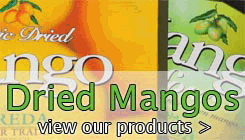By Fr. Shay Cullen
I was visiting villages where a new group of small farmers had become members of the ever growing Preda Fair Trade partnership. They lived off mixed farming and mango trees. They proudly showed me some of the benefits of the fair trade payments and dividend bonuses they received for their mango fruits.
Each family had something to show, a new well and hand pumps for clean water, a piggery, a small store, a new metal sheet roof on their small house, and a goat. Their children were going to school and there was no child labor. Simple things, but so important to them. Life had greatly improved because of Preda Fair Trade practices and that is how it should be. With greater social justice in the developing counties, life could be even better for the billion hungry people in the world.
In one village, the Preda fair trade had built a small community center where people could gather and shelter from typhoons and a Preda partner in drying mangos, “Profood”, donated a two-room school.
Junito, a farmer in Mindanao said, “Because of the good price I get from Preda for my mangos, we have better food and my children are going to school. They don’t run off to the town where they would fall into bad influence, even though we are poor, we have a decent life”.
That is one of the important unseen benefits that Preda Fair Trade brings – the prevention of child labor and exploitation. Unfortunately, thousands of teenage children, boys and girls in the Philippine islands where Preda has it projects, are lured away from poor, hungry homes with a promise of good jobs and pay as domestic helpers or in cafes and hotels.
When they arrive at the city with a recruiter or person trafficker, they are frequently sold into a sex bar where they are abused and sold to local or foreign sex tourists. The parents of the children do not know where they have gone or they too have been paid money to allow their children to go find the work. Preda social workers save many of these children and provide a safe home with therapy and education, and reunite them with their parents.
In the Preda Fair Trade partnership, the farmers receive seminars about these dangers and never to allow their children to go with recruiters. Preda has been working in this way since1975 and implementing agricultural improvement programmes.
Overcoming poverty and hardship is a struggle for the poor and while they work hard to grow the food for the rich and better off people in the towns and cities, they don’t get the just reward for their hard work and skills in producing food that keeps everybody else alive. The goal of Fair Trade is to have a fair, living income for the small farmers. Fair trade advocates are challenging this unjust system, trying to make a more fair global trading system.
In a special way, the fair trade importers like DWP and GEPA in Germany and Libero Mundo in Italy have an alternative system. They buy direct from the farmer cooperatives for coffee or mangos though the Preda Fair Trading organization, then supply the products to the network of world shops all over Europe. The shops are managed and operated by dedicated volunteers who are aware and knowledgeable about the situation of injustice and exploitation in the developing world.
The world shops provide a wide range of beautifully presented, fairly traded products to thousands of concerned customers who want to make this a better and more just world and don’t want to be part of the exploitation and unfair international trading system.
Not only do these products directly help children in the Philippines but also children in the European countries because of the healthy nature and being free of all chemicals and additives. One third of the children in the UK for example suffer obesity due to unhealthy foods.
The fresh mangos are delivered by the small farmers to the food drying station Profood and they are paid the fair price. Then under the highest hygienic standards, the mangos are washed, pealed, sliced and dried in ovens. Then they are packaged and shipped to World Shops and supermarkets mostly in Europe.
After some weeks, the Preda producer development officer goes to the area to visit the farmers and gets the records from the Profood drying stations for the number of kilos each farmer delivered and pays them a bonus dividend. Every transaction is recorded carefully to provide full transparency. There is much we can all do to make this a more fair and just world. Buying Fair Trade products helps this cause.
It’s so encouraging to know there are wonderful people involved in this movement and to hear Pope Francis tell the world that the Catholic Church must focus more on social justice, compassion, peace-making and helping victims and the wounded in this world. We can help bind up the world of injustice by doing justice and supporting Fair Trade. It’s helping heal the exploited children too. (visit www.predafairtrade.net, email shaycullen@preda.org)

